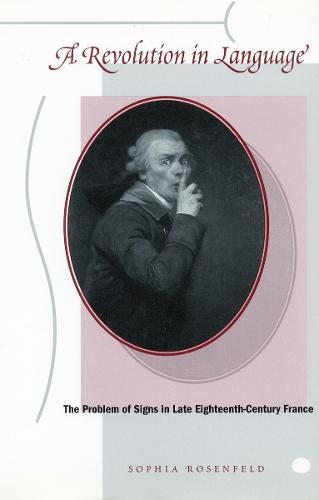Overview
What is the relationship between the ideas of the Enlightenment and the culture and ideology of the French Revolution? This book takes up that classic question by concentrating on changing conceptions of language and, especially, signs during the second half of the eighteenth century. The author traces, first, the emergence of a new interest in the possibility of gestural communication within the philosophy, theater, and pedagogy of the last decades of the Old Regime. She then explores the varied uses and significance of a variety of semiotic experiments, including the development of a sign language for the deaf, within the language politics of the Revolution.
Full Product Details
Author: Sophia Rosenfeld
Publisher: Stanford University Press
Imprint: Stanford University Press
Dimensions:
Width: 15.30cm
, Height: 2.90cm
, Length: 22.90cm
Weight: 0.713kg
ISBN: 9780804733144
ISBN 10: 0804733147
Pages: 424
Publication Date: 01 July 2001
Audience:
College/higher education
,
Professional and scholarly
,
Undergraduate
,
Postgraduate, Research & Scholarly
Format: Hardback
Publisher's Status: Active
Availability: In Print

This item will be ordered in for you from one of our suppliers. Upon receipt, we will promptly dispatch it out to you. For in store availability, please contact us.
Reviews
Until Rosenfeld's book, no one has attempted to explain in any convincing manner why the meanings and usage of words were so central to revolutionary political culture. . . . [A] well-researched and creatively argued book for those who claim that the revolution was, above all else, a misplaced and deadly struggle to determine who would speak for the nation. -- American Historical Review
Sopia Rosenfeld's intriguing study deals with a chapter in the intellectual history of the Old Regime and the Revolution of 1789, the puzzle of language... A very fine piece of historical scholarship... This really is a must-read for any serious student of the French Revolution. - History: Reviews of New Books Until Rosenfeld's book, no one has attempted to explain in any convincing manner why the meanings and usage of words were so central to revolutionary political culture... [A] well-researched and creatively argued book for those who claim that the revolution was, above all else, a misplaced and deadly struggle to determine who would speak for the nation. - American Historical Review A Revolution in Language is a thoroughly researched and documented study that convincingly demonstrates the extent to which both philosophes and revolutionaries were preoccupied with problems of language. It furthermore shows that the epistemology of the Enlightenment strongly affected not only the thinking of revolutionary leaders, but also the development of modern French political culture. - Gita May, Columbia University
Author Information
Sophia Rosenfeld is Associate Professor of History at the University of Virginia.




